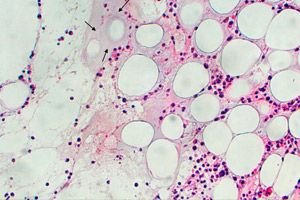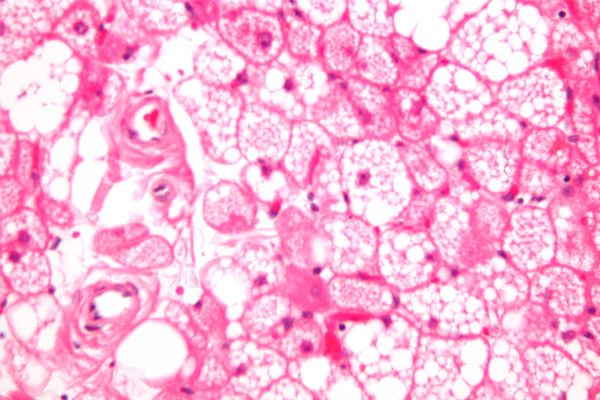
All iLive content is medically reviewed or fact checked to ensure as much factual accuracy as possible.
We have strict sourcing guidelines and only link to reputable media sites, academic research institutions and, whenever possible, medically peer reviewed studies. Note that the numbers in parentheses ([1], [2], etc.) are clickable links to these studies.
If you feel that any of our content is inaccurate, out-of-date, or otherwise questionable, please select it and press Ctrl + Enter.
Fat cells "feed" cancer
Last reviewed: 02.07.2025
 ">
">In one of the latest studies, specialists found out that cancer cells need nutrition, and they feed on fat cells. Scientists came to such conclusions after a series of experiments with laboratory rodents, in addition, it was found that blocking a certain substance helps stop the spread of metastases throughout the body.
Scientists have noted that healthy cells must remain in their place in the tissues, otherwise a self-destruction mechanism is triggered in them. But cancer cells can constantly move throughout the body and form new and new tumors. For a long time, specialists from different countries have tried to figure out what contributes to the movement of cancer cells through the vessels, since this process is quite energy-consuming.
The study was conducted at the University of Barcelona, where specialists discovered how cancer cells “feed” themselves during their “travels” through blood vessels. In their report, they noted that some types of cancer cells can produce CD 36, a special substance that provides them with nutrition from fat molecules from nearby cells. During the experiments, scientists found that if CD 36 is blocked, metastases stop spreading throughout the body, and this also slows down the development of those metastases that have already entered the bloodstream.
Analyzing the medical database, scientists found that active manifestation of CD 36 often occurred in cancer of the bladder, mammary glands, lungs and other organs. Now a team of scientists from the University of Barcelona is trying to find antibodies to CD 36, which will help in the treatment of cancer. The specialists expect to receive the first results in 4 years. In their study, the scientists also found that rodents have a relationship between fat consumption and the size and speed of cancer spread throughout the body, and now they intend to establish whether a similar relationship exists in humans, for which a large-scale study is being organized.
The scientists are working with many cancer patients, but until the study is complete, they do not recommend that people with cancer eliminate fats from their diets.

Recently, a team of specialists in the USA found that sun rays can destroy cancer cells and the results of this work were published in one of the scientific journals.
At the University of California, a group of scientists conducted a scientific experiment with human cancer cells taken from one of the patients who agreed to participate in the scientific work. The scientists divided the cell samples into two parts, one of which was exposed to visible light, and the other to sunlight. As a result, in the second part, the division of cancer cells significantly decreased. The researchers themselves note that sunlight contributes to the formation of unnecessary fragments in the genetic sequence of cancer cells, which blocked their ability to reproduce.
Scientists from California are confident that their work will help find new ways to fight cancerous tumors.
